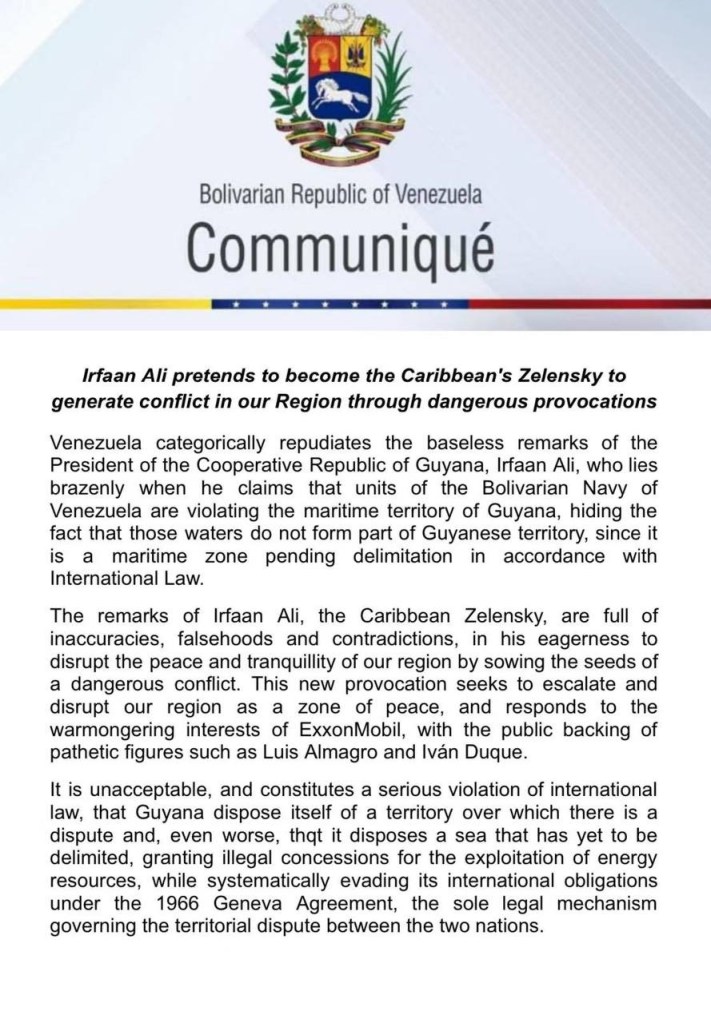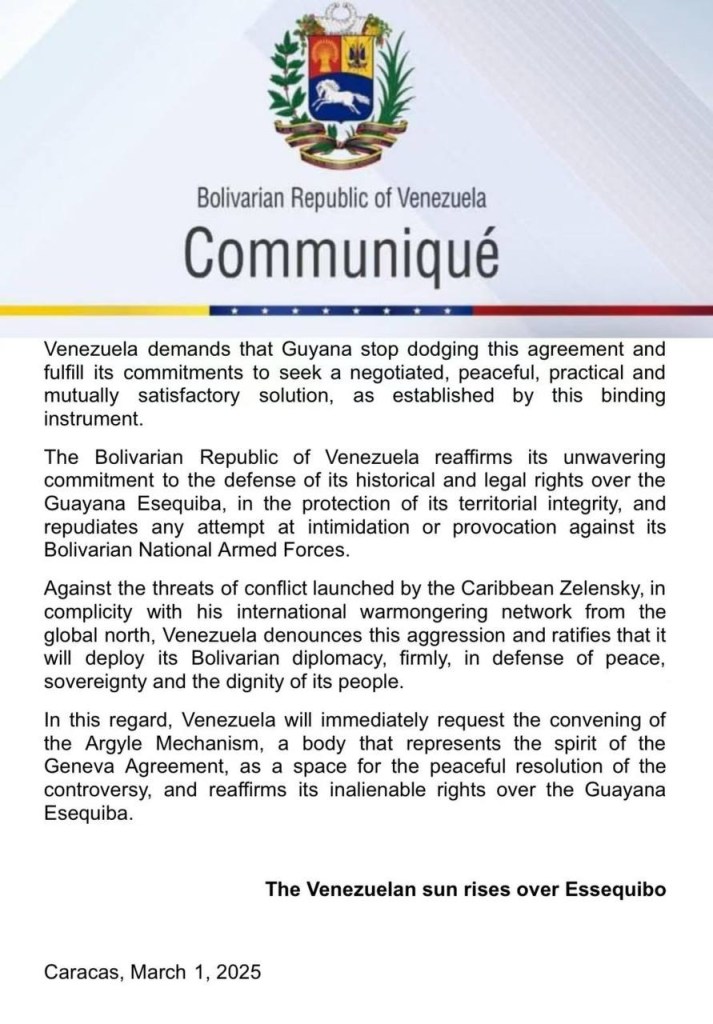US, Guyana denounce Venezuelan naval incursion
Related:


Venezuela Rejects Guyana’s Accusations and Denounces Media Manipulation
Venezuelan President Nicolás Maduro expressed the solidarity of the Venezuelan government and people with the peoples of Palestine and Lebanon, victims of military attacks carried out by Israeli occupation forces with the support of the US army. Before thousands of people in the city of La Guaira, President Maduro condemned the Zionist entity for killing more than a thousand people in its attacks on civilian areas of Lebanon this week, including around 500 children, a massacre added to the genocide being perpetrated for almost a year in the Gaza Strip, with nearly 42,000 people killed, around 10,000 missing, and some 100,000 wounded.
Security cooperation between Guyana and the US appears to deepen
U.S. Marine Corps Major General Julie Nethercot’s, U.S. Southern Command Strategy, Policy, and Plans Director has visited Guyana. Her visit to Guyana from May 6th to May 8th possibly or probably signals a significant step forward in our nation’s defence and security partnership with the United States, some observers believe. This visit follows closely on the heels of Major General Evan Pettus’ – also of the U.S. Southern Command – engagement in February, probably highlighting a deepening commitment of the United States to bolstering Guyana’s security capabilities.
Related:
US Navy Aircraft Overflight Increases Regional Risk: Padrino
On Thursday morning, U.S. authorities announced that two U.S. Navy F/A-18F Super Hornet fighter jets will carry out a flyover over “Georgetown and its surroundings” with the approval of the Guyanese government chaired by Irfaan Ali.
Venezuela Advances in Exercising Sovereignty Over Essequibo Region
The head of the Strategic Operational Command of the Bolivarian National Armed Force (CEOFANB), General Domingo Hernández Lárez, reported that Bolivarian National Armed Force (FANB) troops continue to work to interconnect the newly created Guayana Esequiba state with the rest of the Venezuelan territory.
Related:
Brazil reinforces border with Venezuela, Guyana with armored vehicles
Guyana, Brazil expand strategic military cooperation
Growing US Military Presence in Brazil
From 2004 to 2017, Brazil led the military component of the United Nations-backed peacekeeping mission to Haiti known as MINUSTAH. Since the U.N. Security Council authorized a new mission to Haiti last October, however, Brasília has been shy about supporting the operation. Brazil has offered to train Haitian police forces, but it has declined multiple requests from both the United States and United Nations to provide forces or financing for a new mission.
The profits received by the Guyanese national treasury are minuscule compared to the enormous profits to be reaped by the US oil company ExxonMobil from the exploitation of crude oil in the Stabroek block, located in waters that have not yet been delimited with Venezuela. Although this fact has caused the historical dispute between both nations to heat up, it is paradoxical that Guyana is the least favored in this equation.
Guyana to Receive Pyrrhic Profits From ExxonMobil Oil Production
The vice president of Venezuela, Delcy Rodríguez, has made reports of the Cooperative Republic of Guyana’s continued violations of international law and the Geneva Agreement in favor of the transnational oil company ExxonMobil in regards to the Essequibo territorial dispute, stating that new irregularities are being unveiled on the submissive nature of the Guyanese government towards the US oil corporation.
Scandal Unveiled: Guyana’s Government Finances ExxonMobil’s Taxes
President Maduro to Guyana’s President Ali: You Are Opening the Door to the Devil
The Venezuelan president then touched on the International Court of Justice (ICJ). He explained to Ali that going to this court of the United Nations to resolve the dispute over the Essequibo must arise from the will of both states, Guyana and Venezuela, as indicated in the 1966 Geneva Agreement, and Venezuela does not recognize this court’s right to rule on the Essequibo claim.
At that moment, Maduro brought out the list of the 119 countries that do not recognize the ICJ. As he unfolded the paper, Maduro looked at the faces of some representatives of those nations present in the room. “You, Bahamas, here you are on the list; you do not recognize that International Court,” Maduro said looking at the face of Philip Davis, prime minister of that Caribbean island. “You, Mr. Keith (Rowley), you don’t recognize the ICJ either,” he said the prime minister of Trinidad and Tobago. The president closed the roll call with Irfaan Ali, whose nation likewise does not recognize the ICJ, although they went to it, in 2018, to ask it to rule on the “legal validity” of the 1899 Paris Arbitral Award, a document that placed Essequibo in the possession of Guyana which, at that time, was a British colony. Essequibo has been part of Venezuela since 1777, when the Captaincy General was founded, according to certified texts.
Growing US Military Presence in Brazil
To this end, the United States faces a series of obstacles in our continent. The most important immediate obstacle is Venezuela, clearly counter-hegemonic, bent on building important geopolitical bridges with Russia, China and Iran, and now focused on beginning to resolve the problem of the Guyanas.
Caracas, December 4, 2023 (venezuelanalysis.com) – Venezuelans voted to support the country’s sovereignty claim over the Essequibo Strip in a non-binding referendum on Sunday.
Venezuela: Referendum Delivers Overwhelming Backing for Essequibo Claim
An air of bonanza has raised the projections of the Exxon Mobil corporation, which accumulated around 414 billion dollars in 2022, an unprecedented income in its history, which represents 44.8% more than the previous year. It is a gigantic increase if compared to its crisis in 2020, when its losses put its place in the stock market in jeopardy. Also from the research of that American corporation, it is said that Guyana could become “the country that produces the most barrels of oil per inhabitant in the world, surpassing Kuwait, in that case, when measuring the wealth per capita of its 800 thousand inhabitants, it would become a rich country, since in 2021 its GDP increased by 57.8% and in 2022 by 37.2%”.
Guayana Esequiba: Geo-economics of an Occupation
You must be logged in to post a comment.